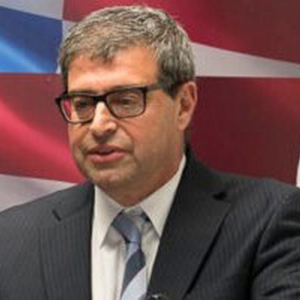West, Latin America Increasingly Vulnerable to Iran's Criminality

By: Luis Fleischman - 06/06/2024
Share:
One of the arguments to support the destruction of Hamas in Gaza is that the Palestinian terrorist group's survival will likely encourage more terrorism globally by other organizations such as al-Qaida, ISIS, or Iran proxies.
Indeed, empirical evidence suggests that the United States, the West, and Latin America are more vulnerable to Iran’s criminality more than one might think.
Most recently, it was reported by the Israeli spy agency Mossad and confirmed by the Swedish authorities that Iran is using criminal organizations in Europe to target Israeli embassies. This strategy is typical of Iran, a rogue country that encourages relationships with criminal organizations to raise funds for its cause and to cooperate with them in terrorist activities.
Iran's proxy, Hezbollah, has had a presence in Latin America for several decades.
Its presence and local connections have increased in the last two decades since Hugo Chavez took the reins of government in Venezuela.
Currently, Iran maintains strong relations with left-wing dictatorships such as Venezuela, Nicaragua, and Cuba and with what Carlos Sanchez Berzain calls Para dictatorships, or governments that, although not formal authoritarian regimes themselves, support left-wing autocracies.
Examples include Colombia, Brazil and to a lesser extent , Mexico.
Brazil's ambassador in Teheran recently said that Israel's objective in attacking a building near the Iranian embassy in Syria on April 1 was to force Iran's entry into the war in Gaza.
According to the ambassador, Israel wanted Iran to be directly involved in the war to force a U.S intervention.
Such a scenario, according to the Brazilian envoy in the Islamic Republic, would help Israeli Prime Minister Benjamin Netanyahu's political survival at home and secure global support for Israel.
The diplomat’s statement reflects the alliances Brazil is pursuing under Lula Da Silva.
Da Silva is anti-American, anti-NATO, pro-Russia, and pro-China.
His approach includes strengthening relations with rogue states such as Iran.
Just last November, Brazilian police, in cooperation with intelligence help from the Mossad, arrested two people on terrorism charges.
It's believed the police were conducting an operation aimed at dismantling a Hezbollah cell that planned attacks, supposedly against Israeli, Jewish, American, or Western targets in the country.
After Israel publicly thanked the Brazilian police for its work, the country's Minister of Justice admonished the Israeli government with a hostile statement reaffirming Brazil's sovereignty and distancing the government from Israel.
Three months later, Lula issued a statement comparing Israel's war in Gaza to destroy Hamas to the Nazis' attempt to exterminate the entire Jewish nation during World War II.
That association was not warranted and is incorrect from any reasonable perspective.
However, it concretely reflected, Brazil's foreign policy and its place in the world system. Ultimately, Brazil withdrew its ambassador from Tel Aviv in disagreement with Israel's war in Gaza.
The president of Colombia, Gustavo Petro, also blasted Israel from the outset.
Like Lula, he compared Israel's war in Gaza with the Holocaust and finally broke diplomatic relations with Israel, joining Venezuela, Bolivia, Nicaragua, Cuba, and Belize.
Until Petro's rise to power, Colombia had been on very good terms with Israel, including trade, technological, and military cooperation.
Petro, a former guerilla leader, showed where he stands on the world map, which is not with the Western world.
Petro also expressed open support for Iran when it blamed Israel for the Islamic Republic's missile attack on the Jewish state. Colombia will be the next country to bolster an alliance with the Ayatollahs' regime.
Such political positions by those countries will eventually affect the citizens of Latin America, their security, and the security of the United States.
Hezbollah also has ties with the Brazilian mega gang First Capital Command (PCC). Lebanese traffickers tied to Hezbollah have reportedly helped the PCC purchase weapons by providing them with access to international arms smuggling channels.
The PCC has also become a transnational criminal organization whose illegal activities have expanded globally.
It exports cocaine to Europe and has a presence in multiple states in the United States.
Likewise, it is responsible for millions of digital crimes and scams.
It is also heavily involved in environmental crime, particularly in the illegal gold mining business. They not only help destroy the Amazon rainforest but also operate the mines, practicing slavery and atrocious human rights violations. (The Maduro Government and Colombian guerilla members are also part of this nefarious endeavor).
In summary, as Iran extends its reach into more Latin American countries it's increasingly likely that the regime and its proxies will conspire with criminal organizations to carry out terrorist attacks or hostile activities, as has happened recently in Europe.
Furthermore, this will further affect the already high crime rates that have caused astronomical levels of anarchy and violence in Latin America.
Fewer and fewer countries on the continent manage to combat these cartels and gangs and ordinary citizens are the ones who pay the price.
Iran remains a global threat, and indulgence towards the regime of the ayatollahs or its proxies could take a heavy toll in the form of increased terrorism and uncontainable high levels of criminality.
«The opinions published herein are the sole responsibility of its author».